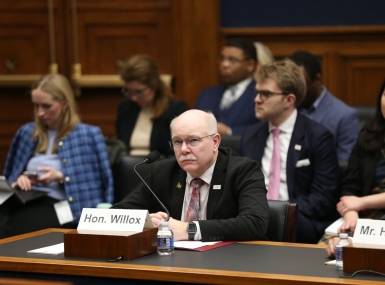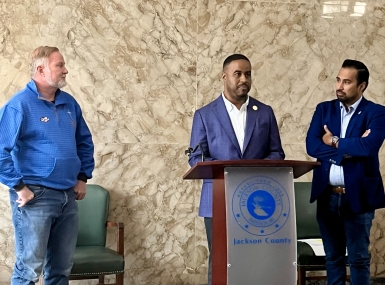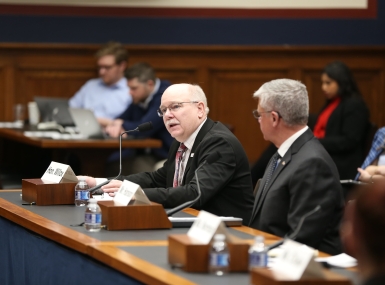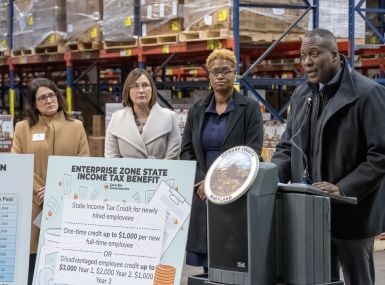County Countdown – Oct. 22, 2024
Upcoming Events
Related News
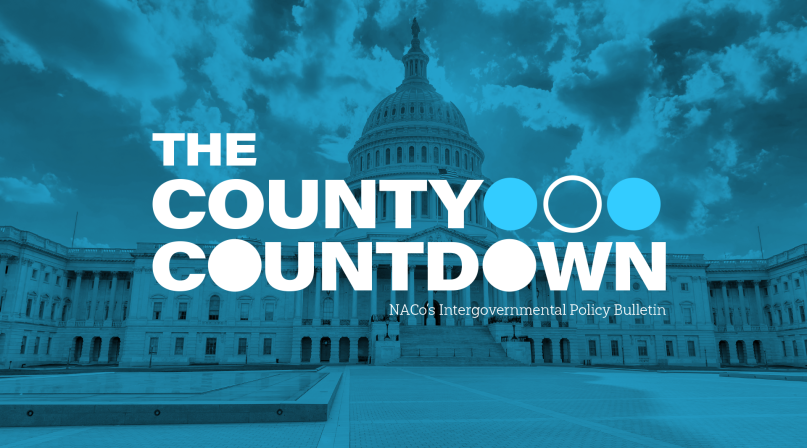
Every other week, NACo's County Countdown reviews top federal policy advocacy items with an eye towards counties and the intergovernmental partnership.
FCC moves forward with georouting for the 9-8-8 Suicide and Crisis Lifeline
Last week, the FCC approved a Report and Order to route calls to the 9-8-8 Suicide and Crisis Lifeline based on approximate location of the caller instead of the caller’s area code. The FCC’s actions mark a key success for counties, which advocated aggressively for accurate routing of 9-8-8 calls to become a national requirement.
- By the numbers: Since launching in 2022, the 9-8-8 Suicide and Crisis Lifeline has received over 10.8 million calls, texts and chats, making it an essential tool for counties in supporting the mental health of residents.
- Bipartisan support: 9-8-8 georouting has been a priority for the Bipartisan Senate Mental Health Caucus, co-founded by Sen. Alex Padilla (D-Calif.) and Sen. Thom Tillis (R-N.C.).
- NACo impact: Last year, following NACo’s advocacy on Capitol Hill and meetings with the FCC, Sens. Padilla and Tillis introduced the Local 9-8-8 Response Act of 2023, with a companion bill introduced by Rep. Tony Cárdenas, co-chair of the House 988 & Crisis Services Task Force.
- Learn more about the county role in implementing the 9-8-8 Suicide and Crisis Lifeline here.
Hurricane response and election administration
Two major hurricanes have hit the Southeastern U.S. this year, devastating communities just weeks before the November elections. Counties are on the front lines of responding to these natural disasters even as we prepare to administer the 2024 elections.
- Record storm: Hurricane Helene, which made landfall on September 23, is now the second most deadly hurricane after Katrina.
- Election management implications: Natural disasters can put major strain on election administrators and polling places as they deal with infrastructure and logistic issues.
Medicaid Inmate Exclusion Policy
Counties continue to advocate for reform of the Medicaid Inmate Exclusion Policy, an area highlighted by NACo's Commission on Mental Health and Wellbeing in its final report.
- Insights from California waiver: A report from earlier this year examined the implementation of California's Medicaid Section 1115 Reentry Waiver across 11 counties. This waiver, the first of its kind in the nation, provides Medicaid-covered health services to individuals transitioning out of incarceration.
- Key findings: The report highlights potential to reduce opioid overdose deaths and improve health care access for up to 80 percent of people being detained.
- Why it matters: The implementation of pre-release Medicaid coverage in California is reshaping how counties approach reentry health care, and NACo is working to share this story with federal policymakers.
Passenger rail funding
The U.S. Department of Transportation's Federal Railroad Administration (FRA) announced over $1 billion in funding through the Federal-State Partnership for Intercity Passenger Rail Program, building on a previous $8.2 billion investment.
- Program purpose: The program aims to expand and modernize intercity passenger rail outside the Northeast Corridor, addressing infrastructure backlogs and improving performance.
- County role: Many counties serve as key transportation hubs – with rail networks driving local and regional economies – and directly support over one-third of the nation’s transit systems.
- How to apply: The FRA is currently accepting applications as well as offering technical assistance to potential applicants before the deadline. Applications are due on December 16, 2024. Learn more here.
Solid waste infrastructure funding
The EPA announced $58 million in funding through the Solid Waste Infrastructure for Recycling (SWIFR) grant program, aimed at improving local infrastructure for waste and recycling management
- What is the SWIFR program? Funded through the Bipartisan Infrastructure Law, SWIFR grants help counties reduce landfill use, cut greenhouse gas emissions, and promote recycling.
- County examples: Counties like Chaffee County, Colo., Durham County, N.C., and Chemung County, N.Y. have already benefited from the program, using funds to enhance recycling facilities and reduce waste contamination.
- How to apply: Counties can apply for SWIFR grants through December 20, 2024. Counties may also submit an informal Notice of Intent to Apply to the EPA by November 15, 2024 to streamline the process. Learn more here.





